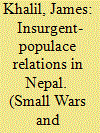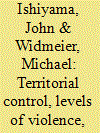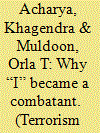|
|
|
Sort Order |
|
|
|
Items / Page
|
|
|
|
|
|
|
| Srl | Item |
| 1 |
ID:
111889


|
|
|
|
|
| Publication |
2012.
|
| Summary/Abstract |
The first objective of this article is to provide conceptual clarity regarding the term 'support' in the context of insurgent campaigns. While it is commonly claimed that insurgent and counterinsurgent forces compete for the support of the populace, there is often ambiguity as to whether this refers to a voluntary preference for a group of armed actors (attitudinal support), or a set of actions that provide direct benefits to one of these groups (behavioural support or collaboration). Furthermore, while a number of academics and practitioners focus upon the former on the assumption that it translates into the latter with sufficient consistency (Lawrence 'of Arabia', Mao, etc.), others maintain a contradictory stance (Kilcullen, Kalyvas, etc.). The findings from research undertaken into the 1996-2006 conflict in Nepal suggest a more complex reality in that certain forms of collaboration (e.g. provisions of information) seemingly necessitate supportive attitudes to a greater extent than others (e.g. supplies of food). The second objective is to evaluate the various approaches used by the Maoist insurgents to generate these distinct forms of support. While their ideology largely failed to resonate with the populace, attitudinal support was obtained through various 'popular appeals', including land reform, an opposition to an increasingly repressive monarchy, and campaigns to empower certain marginalised sectors of society. In contrast, the development initiatives of the Maoists, and their nationalist rhetoric in opposition to US and Indian influence were substantially less effective. Each of these initiatives were undertaken to obtain collaboration via attitudinal support, but the former was also generated directly through the use of coercion against specific non-combatants.
|
|
|
|
|
|
|
|
|
|
|
|
|
|
|
|
| 2 |
ID:
126022


|
|
|
|
|
| Publication |
2013.
|
| Summary/Abstract |
This paper explores debates about electoral patterns in post-civil war societies. In particular, we examine whether the ability of rebels to capture and control territory and the level of violence at the local level explains the electoral performance of former rebel political parties, focusing on the Islamic Renaissance Party of Tajikstan (IRPT) and the Communist Party of Nepal (Maoist) (CPN (M)). Using data from the 2000 legislative election in Tajikistan and the 2008 Nepalese Constituent Assembly election, this paper finds that rebel control over districts did explain rebel party's electoral performance in Nepal. However, rebel control of districts in Tajikistan during the civil war did not predict the electoral performance in the first post-conflict election in that country. This is largely due to the disconnect between the IRPT and the constituencies that had supported it during the civil war, and because the level of control that the party exerted was far less than that of the CPN (M).
|
|
|
|
|
|
|
|
|
|
|
|
|
|
|
|
| 3 |
ID:
156913


|
|
|
|
|
| Summary/Abstract |
This article analyzes combatants’ accounts of their engagement with the Communist Party of Nepal, Maoist—CPN (M). We use Self-Categorization Theory (SCT) as a framework and thematic analysis as a method to examine how social relationships and contextual factors contributed to political party identification during the ten-year-long Maoist insurgency in Nepal. Based on the study of autobiographical narratives written by Nepali Maoist combatants, we demonstrate that a) key social and political experiences cumulatively evoked feeling positively inclined to partisan attachment; b) CPN (M) party ideology, which was presented as a cure-all to socio-political difficulties, actuated the predisposed people’s partisan alignment; c) families were largely unsupportive of their members’ intention to take part in the war; and when they participated, the family responded with antagonism; and d) party ideologues of the CPN (M), who met the partisan-leaning individuals as close friends, accelerated and sustained their friends’ motivation to become involved in the armed conflict. Together the findings culminate in a view that engagement with CPN (M) during the insurgency occurred despite resistance from family and increased exponentially because of societal and political experiences, the strong appeal of party ideology, and social network dynamics.
|
|
|
|
|
|
|
|
|
|
|
|
|
|
|
|
|
|
|
|
|